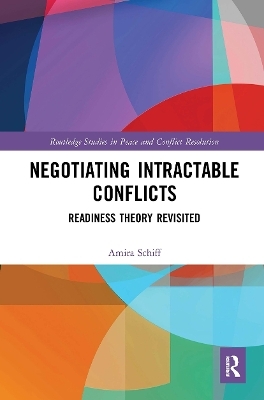
Negotiating Intractable Conflicts
Readiness Theory Revisited
Seiten
2024
Routledge (Verlag)
978-1-032-93005-3 (ISBN)
Routledge (Verlag)
978-1-032-93005-3 (ISBN)
Through the lens of readiness theory, this book focuses on elements that determine the success and failure in negotiating peace agreements in intractable ethno-national conflicts.
Examining three cases of mediated negotiation in Aceh, Sudan, and Sri Lanka, the book provides an analytical framework for studying the processes underlying the movement toward conflict resolution. By studying readiness theory's capacity to identify the factors that influence parties’ readiness to reach an agreement, it constitutes another step in the development of readiness theory beyond the pre-negotiation stage. The work highlights the central role that third parties – mediators and the international community – play in the success or failure of peace processes, illuminating the mechanisms through which third parties affect the dynamics and outcome of the process. The systematic examination of readiness theory in these cases is instructive for researchers as well as for practitioners who seek to successfully mediate intractable conflicts and help adversaries achieve peace accords.
This book will be of much interest to students of conflict resolution, peace studies, Asian politics, African politics and international relations in general.
Examining three cases of mediated negotiation in Aceh, Sudan, and Sri Lanka, the book provides an analytical framework for studying the processes underlying the movement toward conflict resolution. By studying readiness theory's capacity to identify the factors that influence parties’ readiness to reach an agreement, it constitutes another step in the development of readiness theory beyond the pre-negotiation stage. The work highlights the central role that third parties – mediators and the international community – play in the success or failure of peace processes, illuminating the mechanisms through which third parties affect the dynamics and outcome of the process. The systematic examination of readiness theory in these cases is instructive for researchers as well as for practitioners who seek to successfully mediate intractable conflicts and help adversaries achieve peace accords.
This book will be of much interest to students of conflict resolution, peace studies, Asian politics, African politics and international relations in general.
Amira Schiff is faculty in the Conflict Resolution, Conflict Management and Negotiation graduate program at Bar-Ilan University, Israel.
Introduction 1. Theoretical overview and research design 2. The Aceh peace process, 2005 3. The peace process in Sudan, 2002–2005 4. The Sri Lanka p eace process 2001–2004 5. Readiness for negotiation and agreement: lessons for theory and practice
| Erscheinungsdatum | 16.10.2024 |
|---|---|
| Reihe/Serie | Routledge Studies in Peace and Conflict Resolution |
| Zusatzinfo | 1 Illustrations, black and white |
| Verlagsort | London |
| Sprache | englisch |
| Maße | 156 x 234 mm |
| Gewicht | 299 g |
| Themenwelt | Sozialwissenschaften ► Politik / Verwaltung ► Europäische / Internationale Politik |
| ISBN-10 | 1-032-93005-5 / 1032930055 |
| ISBN-13 | 978-1-032-93005-3 / 9781032930053 |
| Zustand | Neuware |
| Haben Sie eine Frage zum Produkt? |
Mehr entdecken
aus dem Bereich
aus dem Bereich
Studienbuch
Buch | Hardcover (2023)
De Gruyter Oldenbourg (Verlag)
44,95 €
erfolgreiche Interessenvertretung durch Prozesskompetenz im komplexen …
Buch | Hardcover (2023)
Wiley-VCH (Verlag)
42,00 €


